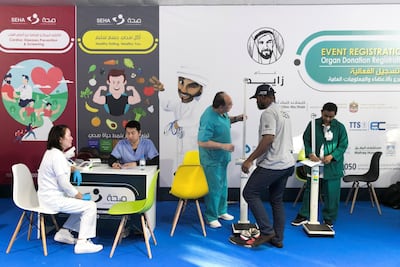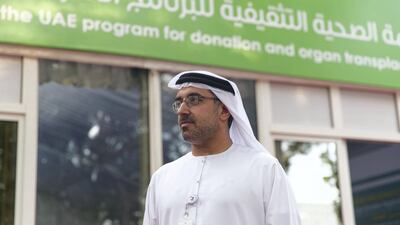New laws permitting organ donation in the UAE have already saved the lives of 37 people, officials say.
Doctors said recent changes to legislation had allowed lifesaving transplants to save patients who previously would have died.
Those saved received organs from only 10 deceased donors.
Changes to the law came into effect early last year, although the introduction of a donor card scheme has yet to be implemented.
As for live donors of organs such as kidneys, Dr Ali Al Obaidli, chief academic officer of Seha, said they were giving the “gift of life”.
“It is the most selfless, kindest, most noble act anyone could do for another person,” said Dr Al Obaidli, also head of the National Organ donation and Transplant Committee.
“We’ve seen sons and daughters donate their organs to their parents and siblings to each other.
“But we’d like to see more people consent to deceased organ donations.”
The subject of organ donations has long been a controversial subject but performing transplants with the organs of deceased donors was legalised in the UAE in 1993.
An issue over the legal definition of death, however, meant transplants were restricted to organs taken from living donors and usually involved kidney operations.
A breakthrough came in March last year when authorities agreed to a legislation framework that allowed transplants from deceased donors.
Today, there are about 6,000 people with primary organ failure, about 4,000 of whom may need kidney transplants.
The remaining 2,000, if they hit end-of-stage organ failure, would have no option other than organs from deceased donors, said Anan Purushothaman, Sheikh Khalifa Medical City’s transplant co-ordinator.
Since the introduction of the legislation in the UAE last year, almost 75 families whose loved ones died in hospital have been approached and asked if they were willing to agree to a transplant.
Of those, only 20 accepted, of which only 10 were deemed to have organs in a sufficiently healthy state to be suitable for transplant.
________________
Read more:
Everything you need to know about the UAE's organ donor programme
Abu Dhabi hospital first to offer heart, liver and lung transplants in UAE
UAE's largest organ unit receiving calls 'every day' from prospective donors
________________
“There needs to be more awareness,” Dr Al Obaidli said. “We are getting there but we do need more public awareness and the support.
“We need it not just from the medical sector but also from other organisations.
“UAE nationals are very supportive of the programme but we would like every resident to know that they have the right to donate their organs and what the process is.”

In 2016, a UAE-based survey was conducted by the Mohammed bin Rashid University in Dubai to study public awareness, beliefs and attitudes towards organ donation.
The research found 68 per cent of respondents said they were ready to donate if they became brain dead, indicating the UAE was largely open to the idea of transplants from deceased donors.
“We would like to see these numbers reflected in real life,” Dr Al Obaidli said.
Despite the continuing battle to change perceptions, he said he was pleased by the progress made and confident of further inroads.
Dr Obaidli described the current number of donors as a good start.
He said medical staff had been trained, with the assistance of experts from Spain and Saudi Arabia, in how best to approach families to tell them about deceased organ donations.
“We have had 268 living relative organ transplants and we just starting with the deceased donor programme,” Dr Al Obaidli said.
“Ten deceased donors after recently a starting multi-organ transplant programme is very good.”
A single donor can save up to eight lives, although only 0.5 per cent of those who die in hospital have suitable organs.
Officials said the transplants that had taken place had involved different nationalities, with the youngest donor being only two weeks old.
Five of those who were able to have lifesaving surgery were young children and the most recent deceased donor was from Nigeria, medics said.
“We have to create more awareness so the public can exercise their right to donate,” Dr Al Obaidli said.

